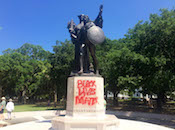Race is one of the most divisive issues in our country’s history, and it seems to permeate almost every aspect of our societal consciousness. In our current Presidential contest, the Democratic contestants are vying for the African American vote in South Carolina. President Obama is working to reform our country’s criminal justice system, in part because of its disparate impact on people of color. In its next term, the U.S. Supreme Court will consider the constitutionality of the consideration of race in undergraduate admissions decisions.
While the issue of race has haunted our country since its inception, states and institutions have come under increasing pressure recently to remove vestiges of racism.
• Students at Oxford University recently lost their battle to remove a statue of Cecil Rhodes, the school’s imperialist benefactor who has been regarded as an architect of apartheid.
• In July of last year, South Carolina removed the Confederate battle flag from the State House grounds, where it had flown since 1962. The flag was a powerful symbol of slavery and succession.
• The University of Maryland’s Bryd Stadium was renamed Maryland Stadium, to discontinue honoring a past president who sought to deny black students admission to campus.
• Earlier this year, the Board of Trustees at Amherst College voted to drop Lord Jeff as the College’s unofficial mascot. A British commander in the French and Indian War, Lord Jeffery Amherst advocated for the destruction of Native Americans.
The list continues. As we and other institutions of higher learning continue to “wrestle” with ways to encourage inclusion and promote diversity, we must think very carefully about purging history. Will we bridge a divide, heal a soul, or instead, eliminate an opportunity to learn from history and to be better because of it? As Toni Morrison, a Nobel Prize and Pulitzer American novelist, editor, and professor emeritus of Princeton University once said “I'm interested in the way in which the past affects the present and I think that if we understand a good deal more about history, we automatically understand a great more about contemporary life.”


